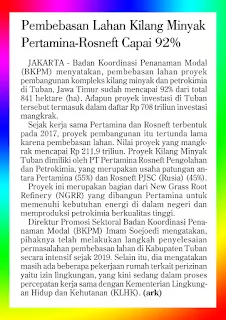The government must fix the management of national upstream oil and gas if it wants to increase oil and gas investment after the Covid-19 pandemic. The reason is that although oil prices have begun to rise after OPEC + cuts oil production, oil and gas companies will be more selective in choosing the locations where they invest.
Energy observer from Trisakti University, Pri Agung Rakhmanto said, the current oil price trend has not been able to stimulate national upstream oil and gas investment. This condition is likely to last until next year. To increase national upstream oil and gas investment, the government is judged to need to improve the competitiveness of the upstream oil and gas business.
"How to be able to attract large scale investment, because competition in the global market to attract investment will be very tight," he said.
The improvement needed is that the government solve the problems that have been around. Some of these include completing the revision of the Oil and Gas Law, ease of operation, and improving the quality of the work areas being auctioned and including the quality of the data. Current conditions make solving these problems even more important for national upstream oil and gas investment.
The same was expressed by the Former OPEC Governor for Indonesia Widhyawan Prawiraatmadja. According to him, oil and gas companies will not be aggressive in investing if crude oil prices have not exceeded the limit above US $ 50 per barrel. However, projects that have been committed by the company will continue, such as the development of the East Sepinggan Block which is postponed to next year.
"But for something new, especially exploration, will be delayed for a very long time until the price returns to a very good level in a sustained time," he explained.
In this condition, he advised the government to provide incentives for the upstream oil and gas sector and gas infrastructure. According to him, the incentives in the gas infrastructure sector will provide consumers access to enjoy liquefied natural gas / LNG whose prices are down.
"Instead of LNG we are exported at low prices, it is better to be used domestically so that it helps the industrial sector. LNG is currently cheaper than gas pipelines. The key is the existence of gas infrastructure, specifically for LNG regasification, "Widhyawan said.
While Former Deputy Minister of Energy and Mineral Resources (ESDM) Rudi Rubiandini suggested the government to change the way of managing national upstream oil and gas so that oil and gas investment is attractive again. One of them is by not giving up the management of all completed oil and gas blocks to PT Pertamina (Persero).
Granting management rights to Pertamina must be accompanied by an evaluation related to block oil and gas production. According to him, maintaining world-class oil and gas companies such as Chevron and Conoco-Philips is a way to maintain current oil and gas production so as not to decrease significantly. Furthermore, if these companies do not leave, the government can offer a new scheme that encourages exploration activities.
"Then the company can be asked to explore with a scheme that makes them not afraid as before after there will be a discovery of new reserves. So that there is hope for the future, "explained Rudi.
Previously, he said oil and gas companies were reluctant to explore because of concerns that management rights would not be continued.
Fluctuating Potential
Related to the movement of world crude oil prices, Widhyawan revealed, it had started to move up. This is because OPEC + and non-OPEC + countries cut their oil production very drastically. In addition to the agreement between OPEC + countries, this production reduction is also assessed because some fields are not economical to produce, where most of the production costs are higher than prices.
This is supported by the easing of mobility restrictions (lockdown) which increases oil demand. For example, in the United States, sales of gasoline and aviation fuel have risen again after briefly reaching their lowest levels as people move. Oil prices will improve in line with increased demand at the time of reduced production.
"In my opinion, this will continue until the end of the year and beyond unless there is a phase two pandemic that makes some countries forced
restriction, "explained Widhyawan.
Pri Agung also expressed the same thing. According to him, easing lockdown, reducing oil production by OPEC +, and cutting shale oil production are factors driving improving oil prices.
"With the 'new normal' scenario which is rather optimistic, oil prices will be the US $ 30-40 per barrel or more. This is more likely to happen, "he said.
Rudi also predicts that oil prices will still be in the range of US $ 30-40 per barrel because production cuts by OPEC + have not had a maximum impact. This is because oil stocks have not decreased significantly because oil demand is still low due to Covid-19.
"Maybe the end of the year or early next year will be able to reach above the US $ 40 per barrel like a number that makes producers start producing," he said.
This condition, according to Rudi, will still be very difficult for the national upstream oil and gas industry. He explained that for oil and gas companies that have managed oil and gas blocks in Indonesia, oil prices of US $ 30 per barrel can only make the company alive.
Investor Daily, Page-10, Tuesday, June 2, 2020


































